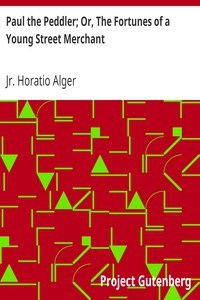Try and Trust; Or, Abner Holden's Bound Boy by Jr. Horatio Alger (easy readers .TXT) 📗

- Author: Jr. Horatio Alger
Book online «Try and Trust; Or, Abner Holden's Bound Boy by Jr. Horatio Alger (easy readers .TXT) 📗». Author Jr. Horatio Alger
“Stand aside, boy!”
“What are you going to do?”
“I'm going to kill that brute.”
“No, no, he's a good dog. He won't do any harm,” said the boy, in alarm.
“I'll kill him,” said Abner, fiercely.
The dog surveyed his enemy with suspicion. He seemed to understand that danger menaced him. He growled in a low, hoarse, ominous tone, which showed that he was on his guard, and meant to do his part of the fighting, if necessary.
His owner had retreated to the door, and now tried to call him away.
“Carlo, Carlo, come out here, sir.”
But Carlo would not come. He had no intention of shrinking from the danger that threatened him, but was bent on defending himself, as became a brave and dauntless dog, whose courage was above suspicion.
If Abner had not been so exasperated, he might have been terrified, but anger re-enforced his courage, and, moreover, he had a great deal of confidence that the axe which he held in his hand would make him more than a match for the dog.
“I'll kill him!” he exclaimed, and once more he swung the axe over his head, and brought it down with a tremendous force in the direction of the dog.
Alas for poor Carlo, if the axe had struck him! But he was wary, and knew something of warlike tactics, and with watchful eye carefully noted Abner's movements. The boy uttered a cry of alarm at the peril of his favorite, but Carlo sprang to one side just as the axe descended, and it was buried in the earthen floor of the cabin so deeply that Abner could not immediately recover it.
The advantage was thus transferred to the other side, and the dog was not slow in perceiving it.
With a bound he sprang upon his adversary, and bore him to the floor, seizing his coat between his strong teeth. He pulled and tugged at this with a strength which no ordinary cloth could possibly withstand.
“Take him off! take him off!” shrieked Abner in terror.
The boy sprang to the rescue.
“Come away, Carlo,” he said, grasping him by the collar; “come away, that's a good dog.”
But, habitually obedient as Carlo was, his young master found it difficult to get him away. He felt that he had received a grievous injury—that his life had been attempted—and he wanted to have satisfaction. Finally his master succeeded in drawing him away, but not till Mr. Holden's coat was badly torn.
The latter was crestfallen and angry, and not so grateful as he ought to have been to his young defender.
“I'll make your father pay for this coat, you young rascal!” he said.
“It isn't my fault, Mr. Holden,” said the boy.
“Yes, it is. It was your dog that tore my coat.”
“Carlo wouldn't have torn it, if you hadn't attacked him.”
“He attacked me first.”
“You had better go away, Mr. Holden, or he may go at you again.”
A low growl from the dog whom he held by the collar re-enforced this suggestion, and Abner, uttering threats both against the dog and his master, strode out of the cabin and bent his steps homeward.
As he entered the kitchen, the housekeeper turned, and, noticing his torn coat, exclaimed, “Good gracious, Mr. Holden, what's happened to you? How came your coat so badly torn?”
“It was a dog,” muttered Abner, who did not care to be questioned.
Mrs. Bickford supposed he must have taken off the coat, and the dog had torn it as it lay upon the ground.
“What a pity!” she exclaimed. “Whose dog was it?”
“Alfred Martin's. I'll make Martin pay for the coat. He has no right to keep such a brute.”
“You must be hungry, Mr. Holden.”
“Yes, get me something as quick as possible.”
“Have you seen anything of Herbert?” asked the housekeeper.
“No,” snapped Abner.
This was a falsehood, of course, but he felt rather ashamed to confess that he had seen Herbert, and that the latter had got the better of him. Mrs. Bickford perceived that he was out of humor, and did not press the question. She concluded that he was angry because his quest had been unsuccessful.
CHAPTER XVI JUST TOO LATE
Leaving Abner Holden bound in his cabin, Ralph led Herbert, by a short path, out of the woods.
“Your best course,” he said, “will be to take the cars for Columbus at Vernon. At Columbus you will go to Wheeling, and from there, over the Baltimore & Ohio Railroad to Baltimore, and thence to New York. But all this will cost money.”
“I have money,” said Herbert.
“How much?”
“About fifteen dollars.”
“Is that all?”
“Is it not enough to carry me to New York?”
“Hardly. Besides, when you get there, how will you get along? Have you any relations in the city?”
“Yes, an uncle.”
“Then you will go to him?”
“No,” said Herbert, hastily.
“Why not?”
“He does not care to see me. Shall I tell you what sort of a letter he wrote to Dr. Kent about me?”
“Yes, tell me.”
Herbert, in indignant language, which correctly represented his feelings, gave the substance of the letter, which is already known to us.
“I shall not feel easy,” he said, “until I am able to return the ten dollars which my uncle sent me. I am not willing to remain under obligations to one who cares so little for me.”
“I think you are proud,” said Ralph, bending his eyes upon the lad's glowing countenance.
“Perhaps I am,” said Herbert; “but is it not a proper pride?”
“I cannot say no,”





Comments (0)